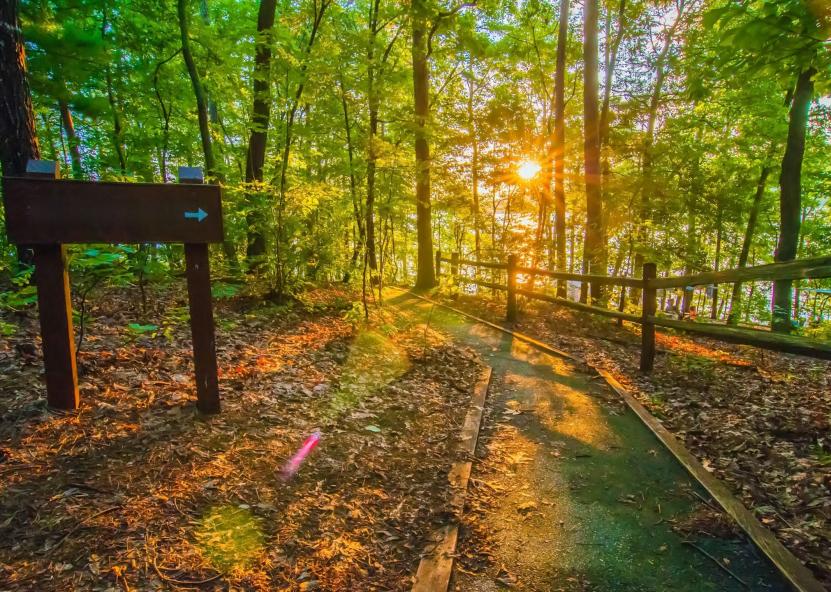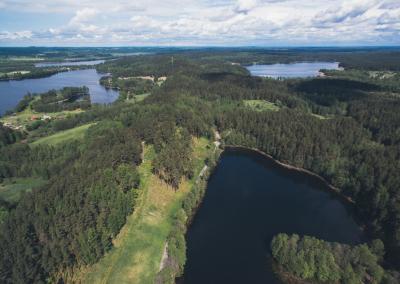Seimas lawyers assess proposal to build summer houses in forests: unconstitutional
The proposal to allow small recreational buildings to be built on forest land contradicts the Constitution and the rule of law, according to the Seimas Law Department. According to them, such construction of holiday homes on forest land would create the preconditions for the spontaneous development of forests.
This conclusion was reached by the Legal Department of the Seimas Chancellery after evaluating the amendments to the Forestry Law registered by the parliamentarians representing the "Nemunas aušros“" group.
„The construction of temporary recreational structures (summer houses) on forest land would create preconditions for the spontaneous (uncontrolled) development of forests, as it is unclear how many and what kind of structures could be constructed on a single parcel of forest land, and there are no proposed requirements for the height and volume of the structures; it would limit the public's accessibility to the forest," the Law Department noted in its conclusion.
The Parliament's lawyers also question whether the proposed initiative is consistent with the proper, rational use and protection of the forest and its resources, the preservation of the natural environment, and would not undermine the welfare of wildlife, a public interest protected by the Constitution.
In the opinion of the Department of Law, the construction of holiday homes on forest land would not contribute to the preservation of the forest as a value protected by the Constitution.
„The proposed requirements for the construction of temporary recreational structures (summer houses) are not clear, precise and understandable, and those that are clear and understandable are not sufficient for the preservation of the forest, which is one of the main natural assets, do not comply with the constitutional imperative of protection of the natural natural environment, and therefore the draft proposed legislation is contrary to Article 54 of the Constitution and the rule of law,'' said the Law Department in a conclusion.
In addition, Article 54 of the Constitution provides that the State shall take care of the protection of the natural environment, fauna and flora, of individual natural objects and of areas of special value, and shall see to it that natural resources are used in moderation and that they are restored and enriched.
„All owners, managers and users of land plots, forests and water bodies must respect the constitutional imperative to protect the natural environment, to protect the natural environment, not to deteriorate it, not to cause damage to the natural environment“, – say the lawyers of the Seimas.
The law does not define the term „temporary recreational structure“
According to the lawyers of the Seimas, the term "temporary recreational building" or "summer house" is not defined in the draft or in any other law, so its content is not clear.
„It is not clear how the term „temporary recreational building (summer house)“ would be understood in the draft: or as a „temporary structure“, the main features of which would be a total area of 24 square metres or less and a limited period of use, while the other technical parameters of the structure (e.g. height of the structure) or the structural features would not be regulated; whether the concept would be understood as a „simple structure“ whose structural features and technical parameters are determined by the Law on Construction and other normative construction technical documents“, – the lawyers of the Seimas note.
„ whether these structures would be of lightweight construction, which would be easy to demolish at the end of the useful life of the structure; whether these structures could have a basement, the area of which, according to the current legal regulation, is not included in the total area of the structure“, – the questions are raised by the Department.
It is not clear to them whether the use of these structures would involve the construction of engineering networks (e.g. water supply, sewage disposal, heat, electricity transmission, electronic communications networks, etc.) and the construction of access roads.
The Law Department is also considering whether it would be possible to cut down some of the trees for the construction of the holiday homes and the provision of infrastructure.
It is not clear how many and how high summer houses would be allowed on one forest plot
After evaluating the initiative of the members of the "Nemunas aušros" group, the Seimas lawyers also note that the draft does not propose to determine how many temporary recreational structures can be built on a single parcel of forest land. According to them, there is also no proposal to establish the minimum size of one or more temporary recreational structures on forest plots, nor are there any requirements for their height and volume.
„Thus, according to the provisions of the draft, an unlimited number of temporary recreational structures (summer houses) could presumably be built on a single parcel of forest land, without any requirements other than a maximum total area," the lawyers said.
They missed the reasoning behind the proposal to allow the construction of summer houses specifically in group IV managed forests, where the objective of farming is to establish productive stands in accordance with environmental requirements, to provide a continuous supply of timber or to produce as much timber as possible as quickly as possible.
Lawyers also point out that protected areas also contain group IV farm forests.
They are unclear about the reasoning behind the proposal to allow temporary recreational buildings of 24 square metres or less on forest land, rather than on other common areas.
The Law Department also raises the question as to which municipal authority should issue the building permit and which state or municipal authority should have the right to revoke the permit.
Questions control
The promoters of houses in forests emphasise that such structures could not be used as permanent residences. However, as legal experts point out, under the Construction Law, a temporary structure and the rights to it are not registered in the Real Estate Register.
„ It is not clear from the provisions of the draft how the mechanism of control over compliance with this proposed condition and other conditions would be ensured, which entities would exercise such control, and from which documents or registers it would be possible to know where on the forest land the temporary recreational structures (summer houses) are located, – the conclusion of the Legal Department notes.
Suggests anti-corruption assessment of the project
The Seimas lawyers, who see a conflict with the Constitution, also believe that the amendments to the Forest Law, which provide for the construction of summer houses in forests, are not in line with the provisions of the Law on Special Conditions for Land Use, the Law on Construction, and do not comply with the principles of clarity and systematicity of legislation set out in the Law on Legislative Framework.
In the opinion of the Legal Department of the Seimas, the proposed amendments to the Law should be subject to the Government's opinion. As ELTA has already reported, in March this year, Martynas Gedvilas, a member of the "Nemunas aušros“" group, together with other members of the group, registered amendments to the Forestry Law, which propose to allow the construction of small holiday homes on forest land. The amendments would allow, under certain conditions, the construction of temporary holiday chalets with a total surface area not exceeding 24 square metres on forest land. If approved by Parliament, the construction of holiday homes on forest land would also not require a change of land use. It is proposed to allow the construction of holiday homes only in group IV – farm – forests, where this „does not contradict territorial planning documents and environmental requirements“. By the way, such structures would not be allowed to be used as permanent residences. The amendments to the law prohibit the conversion of recreational structures built in the forest to residential use. If the structures are used in violation of this requirement or if environmental violations are detected, the building permit could be revoked. At the same time, it is proposed to add to the Forestry Law a requirement that the construction of holiday homes must „not damage the integrity of forest ecosystems“, and that it would be forbidden to „affect natural water bodies, protected areas or natural heritage objects“. The construction of a house on forest land would require a municipal permit, which would be granted to the forest owner upon application and the submission of appropriate environmental assessments. Currently, the law prohibits the construction of buildings on forest land, with certain exceptions provided for by law. ![]()














































































































